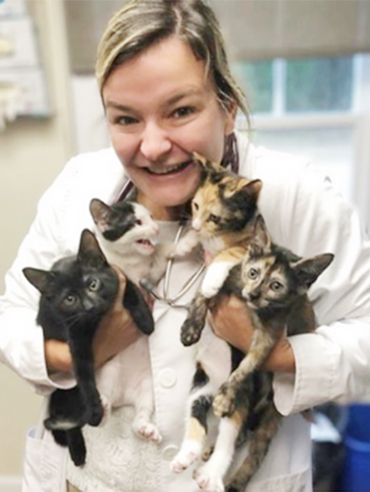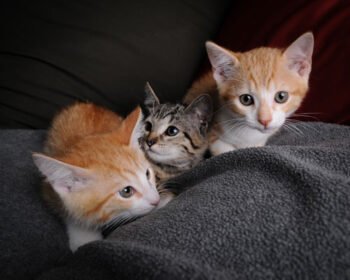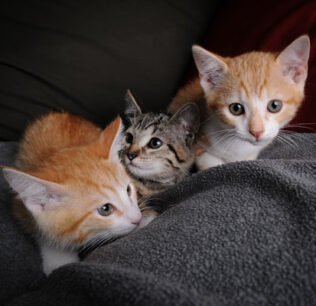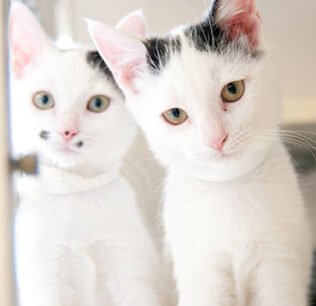
home
Cat & Kitten Adoption FAQ’s
Where does the adoption donation go?
The donation helps cover the costs incurred while the cat/kitten was in the care of our hospitals, such as exams, blood tests, 1st vaccines, spay/neuter, food and medications.
Are the vaccines and exams covered by the adoption donation?
All blood tests, exams and vaccines given to the cat/kitten up to the time of adoptions are covered. Once the cat/kitten is adopted, any further vaccines, exams, and any additional visits to our hospitals are the responsibility of the new owner.
Is the spay/neuter covered by the adoption donation?
Yes, the spay/neuter is covered by the hospital and there will be no further cost to the new owner for the surgery.
Can I have the cat/kitten declawed?
We do not recommend declawing. A doctor will be available to discuss with you alternatives to declawing.
Why are some vaccinations given to my kitten several times?
Your kitten acquired some immunity from its mother (maternal immunity) at birth. This immunity is important because it protects your kitty until we have an opportunity to vaccinate him/her. The only drawback with this immunity is that it blocks the effect of your vaccinations as long as it is present in the kitten’s system. It doesn’t hurt to give the vaccinations when the maternal immunity is still in the kitten’s body, but the vaccines are not fully effective. Depending on how much immunity the mother had available for transfer to her kittens and the amount nursed during the first few days of life, the maternal immunity will drop off when the kitten is somewhere between 6 and 14 weeks of age. Since it would be difficult and expensive to measure your kitten’s level of immunity for each of the five diseases we routinely vaccinate for, we have designed a series of vaccinations, which would provide excellent long-term protection for each of these diseases at a reasonable cost.
What to do if you find a litter of kittens
 Kitten season is upon us. The cats and kittens of Tampa Bay are in need of homes, and local resource centers and rescues are operating at full capacity.
Kitten season is upon us. The cats and kittens of Tampa Bay are in need of homes, and local resource centers and rescues are operating at full capacity.
St. Francis Society Animal Rescue is fostering over 600 kittens and cats, the Humane Society of Tampa Bay has over 300 and the Hillsborough County Pet Resource Center is at 232 percent capacity. They’re all strained for resources, especially veterinarians. The county resource center only has two of its five positions filled and the Humane Society has one vet.
“Stop buying, spay and neuter your own cats and if you see that there’s a feral cat problem in your neighborhood, step up and get some help with trapping,” said Maria Matlack, director of marketing of the Humane Society.
It’s kitten breeding season, and will be until the end of August, and cats and kittens are running amuck. Some are feral (not social with humans) and others are stray (socialized with humans), but they need to be vaccinated and sterilized to keep the cat population healthy.
The end game to overpopulation is to spay and neuter, and the Humane Society serves as a surgery center every Monday to sterilize as many as 100 cats. St. Francis and the county resource center each bring cats and kittens to the Humane Society weekly. The cats are spayed or neutered, vaccinated and either put up for adoption or returned to where they were found if they are feral.
How to help
The process is known as trap, neuter, vaccinate, return. The Humane Society will provide a trap and St. Francis can send one of their volunteers out if people spot strays.
But it’s important to read up and avoid becoming what the Humane Society calls a “kit-napper.”
“What (people) think are orphan kittens, 95 percent of the time the mama kitten is either out hunting or she’s been scared away by them and mama will come back to the kittens,” said Scott Trebatoski, the director of the Hillsborough County Pet Resource Center.
What to do when you find a litter of kittens
 The correct step, according to national and local organizations, is to wait and observe the kittens for a few hours, barring the presence of imminent danger. Alley Cat Allies, a national organization for cats’ well-being, advises to sprinkle flour around the kittens to see if the mother leaves paw prints in case she returns while you’re not watching. If she comes back, leave the cat and her kittens alone. It’s okay to leave out food or water, build an outdoor shelter and keep an eye out for predators. If the mother doesn’t return after a few hours and the kittens begin to look malnourished, intervene by fostering the cats, referring them to a friend or checking Find Feral Friends for a home.
The correct step, according to national and local organizations, is to wait and observe the kittens for a few hours, barring the presence of imminent danger. Alley Cat Allies, a national organization for cats’ well-being, advises to sprinkle flour around the kittens to see if the mother leaves paw prints in case she returns while you’re not watching. If she comes back, leave the cat and her kittens alone. It’s okay to leave out food or water, build an outdoor shelter and keep an eye out for predators. If the mother doesn’t return after a few hours and the kittens begin to look malnourished, intervene by fostering the cats, referring them to a friend or checking Find Feral Friends for a home.
“The best place for kittens is with their mother,” Alley Cat Allies president Becky Robinson said. Shelters can be high stress environments, and can hurt the health of the mother and her ability to care for her kittens.
Once kittens get to four to five weeks old, begin to socialize them so they are fit for adoption after being sterilized at eight weeks.
The difficulty right now is finding homes, even temporary ones, where kittens can go in order to learn to be around humans, St. Francis Society president Kathy Walvoord says.
Following this process is not always possible.
Walvoord said it’s better to rescue a lone kitten found somewhere the mother might not return. Kittens can easily die from hypothermia, so in scenarios such as when she found a newborn behind a Publix in the cranny of an enclosed shipping crate, it’s better to rescue the kitten and nurse it to health.
Alley Cat Allies instructs to never take the kittens to a shelter without researching whether it euthanizes animals. Robinson says to only use the shelter if it has a “Wait Until 8″ program, which the Hillsborough County Animal Resource Center does, or some sort of kitten nursery. The “Wait Until 8″ program freely provides people with all the tools they’d need if they decide to foster the kitten until it is eight weeks old and suitable for adoption.
There’s plenty of feline friends out there. Give the numbers below a call if you’re looking to foster or adopt a new buddy.
Cat rescues
St. Francis Society: Contact form
Hillsborough County Pet Resource Center: 813-744-5660
Human Society Tampa Bay: 813-876-7138
Alley Cat Allies: 240-482-1980
Friends of Strays Animal Shelter: 727-522-6566
Humane Society of Pinellas: 727-797-7722
SPCA Suncoast: 727-849-1048
Humane Society of Manatee County: 941-747-8808
Article courtesy of Tampa Bay Times, Jake Piazza


